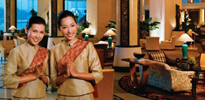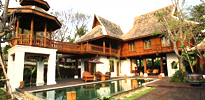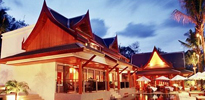Thai Traditional liturgies
Thai rich and long-lasting culture features distinctive traditional rituals. Thai conventional liturgies are shown clearly through wedding ceremony and some Buddhist rites.
Marriage in Thailand is considered a Buddhist religious ceremony with several traditional rituals which need to be followed step by step. Traditionally, dowry (sinsod) is discussed between the groom and the bride’s family. Once it is agreed, engagement can take place. It is when the groom needs to visit the bride’s home to ask for the permission of the bride’s parents. Engaging gifts also need to be given to the bride’s family to show gratitude toward the bride’s family for letting him marry her and reassure his ability to take care of their daughter. The engagement is followed by morning ceremony (Hae Khun Mag), Buddhist ceremony with blessings from nine Buddhist monks and parents and guests, and finally evening ceremony (Song Tua) or sending the newly-wed couple to the bedroom (Ruen Hor).
To ensure happiness and prosperity, the date and time of marriage must be chosen carefully. Recitation of Pali chants is performed by senior monks to bless the couple. The rite must be carried out in the morning to allow monks to partake offered meals. The chants are followed by the application of incense powder into the foreheads of the bride and the groom, a symbolic presentation of coiled string and finally the pouring water over the couple’s hands.
More than 90% of the population is Buddhists so Buddhist religious practices are seen in daily life. Alms offering is one of the most common Buddhist rituals in Thailand. People give food to support monks and learn to give and to let it go. Around 5 to 6 am, monks carry alms bowls and walk with barefoot in the area around the monastery. The most senior monk walks in the front of the line. Devotees want to offer alms must wai monks before putting food in alms bowls. Buddhists give alms for a number of reasons, one of which is to honor their deceased loved ones or with a belief that they will not have to suffer from famine in the afterlife.
Thai people do chanting everyday and worshiping Buddha twice a day. When practicing Buddhism worship, Thais concentrate on the virtues of Triple Holy Gems and express words of kindness at the end of the ritual. Buddhist worship is one of the way to bring peace to mind.
You might also read...

Considered as one of the oldest languages in East and South-East Asia, Thai, the official national language of Thailand, is spoken by the majority of the population. It is classified by linguists as...

The formal Thai national costume, known in Thai as "Thai phra ratcha niyom" (literally Thai dress of royal endorsement), includes several sets of clothing designed for use as national costume in...

Wai is the traditional greeting gesture in Thailand. The wai is a graceful, totally unique action practiced throughout the country. It is accompanied with slight bow, and palms pressed together in...


















































































